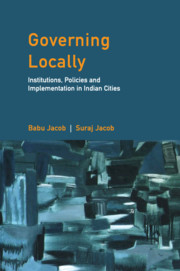9 - Implementing ‘Governing Locally’
Published online by Cambridge University Press: 06 August 2021
Summary
India's constitutional amendment (CA) of 1992 sought nothing less than a transformation of democratic governance by emphasising the governance space closest to citizens. The consequent deepening of electoral democracy was a substantial achievement. In regular elections on a sustained basis, many citizens gained opportunities for local representation and public service. Women, dalits and adivasis served in local governments in unprecedented numbers. But the CA failed in its governance objective. Previous chapters detailed the reasons why the spirit of the CA – namely de facto decentralisation so that city governments could exercise exclusive authority over basic services – was not manifested in implementation processes. Where de facto decentralised governments existed, it was due to governance practices from historical institutions and not the CA. Elsewhere, the failure of decentralised governance through the CA was due to habituated practices that undermined the CA and which can also be traced to historical institutions.
De facto decentralisation is about the autonomy to decide and act, and the capacity to decide and act. The CA and the accompanying mandatory state laws have provisions for formal devolution. At issue are autonomy and capacity traceable to state–local relations. For all the freshness and pressure of the CA, state–local relations were set by policy implementation processes deriving from the legacy of institutions. In Kerala and Tamil Nadu as well as other states, the CA intent simply did not translate to local autonomy and capacity due to the specifics of laws, rule-making authority, rules and execution of rules (processes 2–3–4–5 in Figure 8.1). Policy reform would need to reset the path-dependency in these processes while being pragmatic and expanding the set of realistic possibilities.
The practices of the bureaucracy as a ‘class’ derive from conditioning and norms about how to make laws and how to detail out laws in the form of rules. This conditioning reflects and reinforces traditional concerns of public administration focusing on the form of laws and rules. Bureaucracies are long accustomed to view administration as regulation and the imposition of restraints rather than view administration as a process to develop organisations and work methods that emphasise creativeness. This goes together with suspicions of, and defences against, the erosion of authority. Attention was scarcely given to imagining and designing for the new promises of the CA. A related feature of the old practices was the absence of an orientation towards learning.
- Type
- Chapter
- Information
- Governing LocallyInstitutions, Policies and Implementation in Indian Cities, pp. 242 - 258Publisher: Cambridge University PressPrint publication year: 2021



